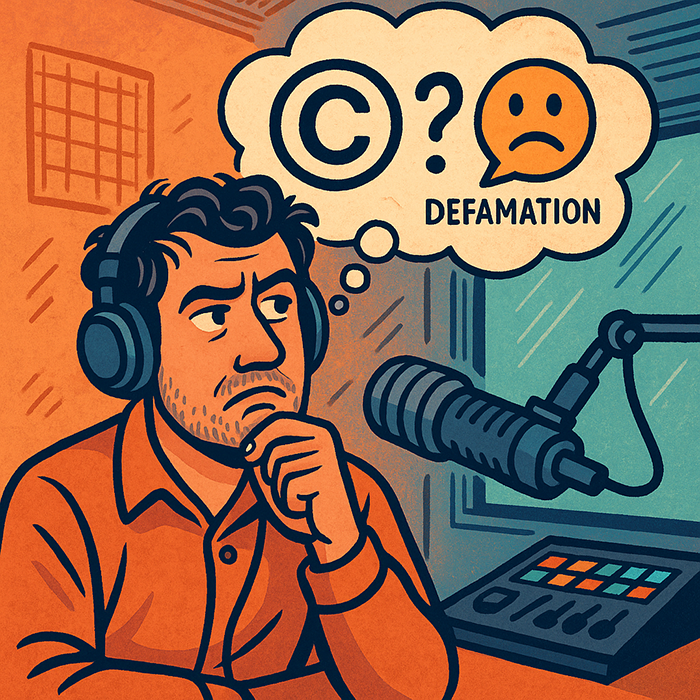When One Clip Cuts Two Ways: How Copyright and Defamation Risks Collide

By Matthew B. Harrison
TALKERS, VP/Associate Publisher
Harrison Media Law, Senior Partner
Goodphone Communications, Executive Producer
 A radio (or video podcast) host grabs a viral clip, tosses in some sharp commentary, and shares it online. The goal? Make some noise. The result? A takedown notice for copyright infringement – and then a letter threatening a defamation suit.
A radio (or video podcast) host grabs a viral clip, tosses in some sharp commentary, and shares it online. The goal? Make some noise. The result? A takedown notice for copyright infringement – and then a letter threatening a defamation suit.
Sound far-fetched? It’s not. In today’s media world, copyright misuse and defamation risks often run on parallel tracks – and sometimes crash into each other. They come from different areas of law, but creators are finding themselves tangled up in both over the same piece of content.
Copyright Protects Ownership. Defamation Protects Reputation
It’s easy to think of copyright and defamation as two separate beasts. One guards creative work. The other shields reputation. But when creators use or edit someone else’s content – especially for commentary, parody, or critique – both risks can hit at once.
Take Smith v. Summit Entertainment LLC (2007). Smith wrote an original song. Summit Entertainment slapped him with a false DMCA takedown notice, claiming copyright they didn’t actually own. Smith fought back, suing not just for the bogus takedown but also for defamation, arguing that Summit’s public accusations hurt his reputation. The court said both claims could go forward.
That case shows just how easily copyright claims and defamation threats can pile up when bad information meets bad behavior.
Murphy v. Millennium Radio: A Close Call with a Clear Message
In Murphy v. Millennium Radio Group LLC, a New Jersey radio station scanned a photographer’s work – with his credit – and posted it online without permission. That alone triggered a copyright claim. But the hosts didn’t stop there. They mocked the photographer on-air, which sparked a defamation lawsuit.
Even though the copyright and defamation claims came from different actions – using the photo without permission and trash-talking the photographer – they landed in the same legal fight. It’s a reminder that separate problems can quickly become one big headache.
Why This Double Threat Matters
— Fair Use Isn’t a Free Pass on Defamation. Even if you have a solid fair use argument, that won’t protect you if your edits or commentary twist facts or attack someone unfairly.
— Public Comments Can Double Your Trouble. The second you speak publicly about how you’re using content – whether you’re bragging about rights you don’t have or taking a shot at someone – you risk adding a defamation claim on top of an IP dispute.
— Smart Lawyers Play Both Angles. Plaintiffs know the playbook. They’ll use copyright claims for takedown leverage and defamation claims for reputational damage – sometimes in the same demand letter.
— FCC Rules Don’t Cover This. It doesn’t matter if you’re FCC-regulated or a podcaster on your own. These risks come from civil law – and they’re coming for everyone.
The Takeaway
The overlap between copyright and defamation isn’t just a legal footnote – it’s a growing reality. In a world of viral clips, reaction videos, and borrowed content, creators need to watch how they frame and comment on what they use, just as much as whether they have permission to use it in the first place.
Because when one clip cuts two ways, you could take a hit from both directions.
Matthew B. Harrison is a media and intellectual property attorney who advises radio hosts, content creators, and creative entrepreneurs. He has written extensively on fair use, AI law, and the future of digital rights. Reach him at Matthew@HarrisonMediaLaw.com or read more at TALKERS.com.



 stating the Walters was accused of embezzling funds from the Second Amendment Foundation defamed him. No such accusation ever actually took place. In its Motion to Dismiss, Open AI argued several points, including that Georgia is not the proper jurisdiction, but it summarized its argument that Walters’ claims didn’t meet the burden of defamation when it said, “Even more fundamentally, Riehl’s use of ChatGPT did not cause a ‘publication’ of the outputs. OpenAI’s Terms of Use make clear that ChatGPT is a tool that assists the user in the writing or creation of draft content and that the user owns the content they generate with ChatGPT. Riehl agreed to abide by these Terms of Use, including the requirement that users ‘verify’ and ‘take ultimate responsibility for the content being published.’ As a matter of law, this creation of draft content for the user’s internal benefit is not ‘publication.’”
stating the Walters was accused of embezzling funds from the Second Amendment Foundation defamed him. No such accusation ever actually took place. In its Motion to Dismiss, Open AI argued several points, including that Georgia is not the proper jurisdiction, but it summarized its argument that Walters’ claims didn’t meet the burden of defamation when it said, “Even more fundamentally, Riehl’s use of ChatGPT did not cause a ‘publication’ of the outputs. OpenAI’s Terms of Use make clear that ChatGPT is a tool that assists the user in the writing or creation of draft content and that the user owns the content they generate with ChatGPT. Riehl agreed to abide by these Terms of Use, including the requirement that users ‘verify’ and ‘take ultimate responsibility for the content being published.’ As a matter of law, this creation of draft content for the user’s internal benefit is not ‘publication.’”